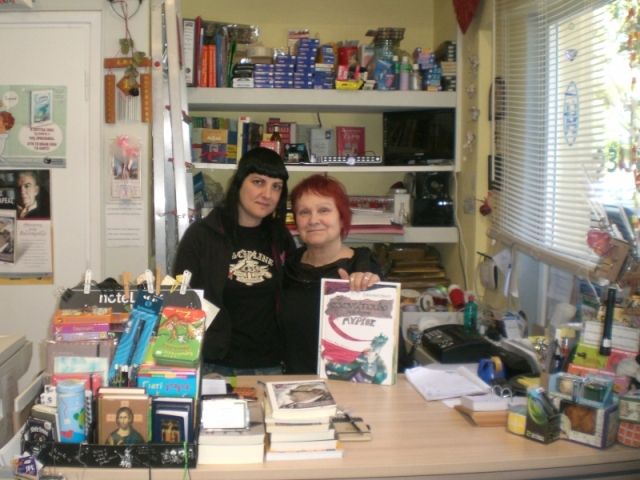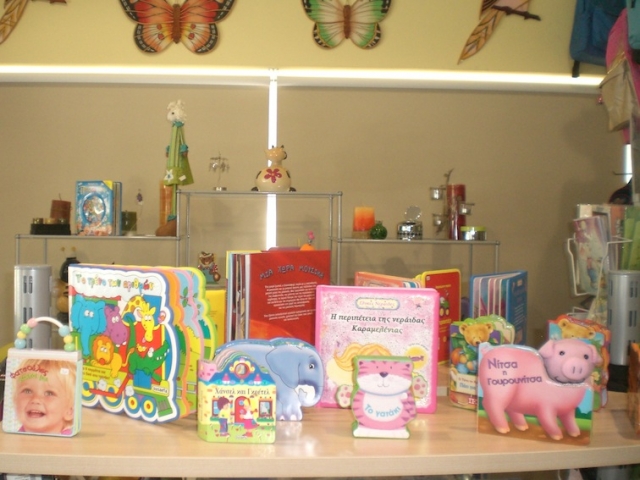Family businesses and small manufacturers are the backbone of Greece’s private sector, which has been and still is the basis of the economic model of the country. Now, Greece is going through a period of consolidation and change in the structure of private enterprise. As a result, the crisis continues to take its toll.
The financial woes have also affected the legendary bookshop "Hestia," which was considered one of the birthplaces of the cultural life in Athens. It was compared to an incubator of ideas, knowledge and intellectual development. Like in the film "You've Got Mail" starring Meg Ryan and Tom Hanks, large impersonal shops in Greece are trying to displace their smaller rivals, which have been relying on their loyal customers for years now.
Unlike the Hollywood story in which the small bookshop finds its place in the large chain, in real life it is hard to find such a symbiotic relationship between the two business types. While Meg Ryan’s small family bookshop was able to add a special feature to one of the representations of Tom Hanks’ corporate chain, shops such as Public, Yannos, Eleftheroudakis and others have been establishing themselves more actively in Athens, thus displacing the smaller players.
"I cannot believe that "Hestia" has closed," was the first reaction of Mrs. Roula, who until recently was the owner of a small neighbourhood bookshop in Perissos. She considers the closure of "Hestia" the end of an era.
20 years ago, she and her husband decided to buy the bookseller’s business in the neighbourhood where they lived with the idea of handing it down to their children. Today, her daughter Vasso is successfully managing the small bookshop despite the negative economic climate. In the story of the two women and in their effort to preserve and develop what they have created to date, GRReporter has seen the positive example in a period of crisis. We have realised from their story that there is light at the end of the tunnel and that it is not the light of a train.
 "We are in a working-class neighbourhood. Prose has never been our strong side. If we used to sell new titles along with the other goods before, it rarely happens today. In the past, for example, when a mother entered the bookshop to buy stationery or school materials, she would look at a title and buy a book. Now, they more often say they will buy one next time."
"We are in a working-class neighbourhood. Prose has never been our strong side. If we used to sell new titles along with the other goods before, it rarely happens today. In the past, for example, when a mother entered the bookshop to buy stationery or school materials, she would look at a title and buy a book. Now, they more often say they will buy one next time."
Mrs. Roula told us that the turnover of the bookshop has fallen by 50% compared to the period before the crisis and that much of the sales were due to school materials. "In September and October, when the new school year begins, we were able to cover a larger part of the cost of rent of the year. Then, we had to take care only of other operating expenses and supplies," she said. "Once Jumbo shops started opening one after another, the sales of this type of goods have significantly dropped."
According to her daughter Vasso, a return of customers has been observed at present. "The goods the big shops offer very often do not meet the expected quality. Our customers often tell us that the school materials they have bought from the shops are not good – pens do not write, felt-tip pens become dry in a month or two, the children's notebooks fall apart after the first couple of weeks." The longstanding relationship of the small bookshop with the suppliers proves to be a guarantee for quality. The mass supply of large chains and the glut of school materials they offer naturally result in such incidents with the goods the large shops sell.
Personal contacts and relationships with other people are some of the major advantages of a small local bookshop. While we were talking with Vasso, a number of customers, who have known the girl since she was a child, entered the bookshop. They live in the same neighbourhood, know the area and maintain close relationships with the local retailers. The smile and personal contact have a decisive influence on the decision of the customer. Each customer was accepted warmly and served with the utmost care. "We have cases when the people do not have all the money to buy all the necessary materials for school. Then, we enter them in the notebook and they pay at the beginning of the following month."
Before opening the bookshop, Mrs. Roula was for many years a teacher in the neighbourhood kindergarten. Today, the grown children come to her daughter Vasso to buy children's books for the  new generation. "Children's books, educational books and stories are in demand today more than ever," says the young heiress, adding that the parents rarely pay 10-15 euro for a new book for themselves, but they never refuse to buy a good story for their children. Grandmothers play an important role in choosing a good book as well. They ensure that children do not forget that, before television and internet games, there is an ocean of stories that you can find yourself just like the generations born before the 21st century.
new generation. "Children's books, educational books and stories are in demand today more than ever," says the young heiress, adding that the parents rarely pay 10-15 euro for a new book for themselves, but they never refuse to buy a good story for their children. Grandmothers play an important role in choosing a good book as well. They ensure that children do not forget that, before television and internet games, there is an ocean of stories that you can find yourself just like the generations born before the 21st century.
In Greece, more than ninety percent of the economy is based on small and medium-sized enterprises. The crisis has changed the consumer behaviour. Technology has also had its impact. If the bookshop in Perissos once were selling about 50 ancient Greek dictionaries (which is taught at school) annually, this last year it has not sold any of them. Internet dictionaries, e-books and the general lack of resources affect consumer decisions. In the bookshop of Mrs. Roula and her daughter Vasso, the spirit is not a memory. They are adamant that they will not refuse to give the best of themselves however difficult the situation may be.